




Dishwasher marks on glasses can be frustrating and can make even the most elegant glassware look dull and unattractive. These marks, also known as etching, are usually caused by the dishwasher’s harsh detergent and the constant water pressure during the wash cycle. Fortunately, there are several effective methods you can try at home to remove these marks and restore the sparkle to your glasses.
One method is to soak the glasses in a solution of warm water and white vinegar. The acidity of the vinegar helps to break down the mineral deposits causing the marks. Simply fill a basin or sink with warm water and add a cup or two of white vinegar. Soak the affected glasses in the solution for about 15-30 minutes, then rinse them thoroughly with clean water and dry with a soft cloth. This method can help to remove mild dishwasher marks and restore the shine to your glasses.
Another effective method involves using baking soda, which is known for its abrasive properties. Make a paste by mixing baking soda with a small amount of water. Gently rub the paste onto the marks using a soft cloth or sponge. Rinse the glasses thoroughly with clean water and dry them with a soft cloth. The abrasive nature of the baking soda helps to remove the marks without damaging the glass.
In some cases, lemon juice can also be effective in removing dishwasher marks from glasses. The citric acid in lemon juice helps to break down the mineral deposits, making them easier to remove. Simply cut a lemon in half and rub the affected areas with the cut side of the lemon. Let the glasses sit for a few minutes, then rinse them thoroughly with clean water and dry with a soft cloth. This method can help to remove stubborn marks and restore the clarity to your glassware.
Preventing and Treating Dishwasher Marks on Glasses
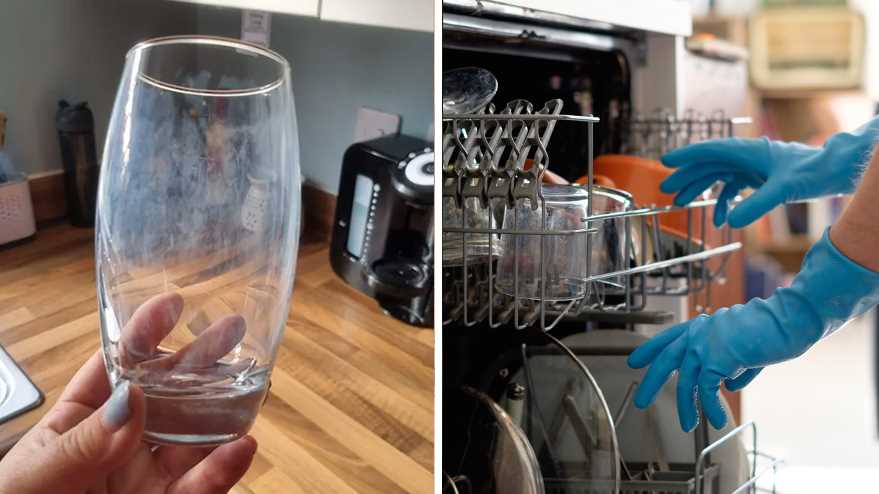
Dishwashers can be a convenient way to clean your glasses, but they can also leave behind unsightly marks. These marks can be caused by the high temperature of the water, the detergent used, or a combination of both. Fortunately, there are several methods you can use to prevent and treat dishwasher marks on your glasses.
Preventing Dishwasher Marks
1. Use a rinse aid: One of the most effective ways to prevent dishwasher marks on glasses is to use a rinse aid. Rinse aids contain special chemicals that help to prevent water spots and streaks from forming on your glasses. Simply add the recommended amount of rinse aid to your dishwasher before running a cycle.
2. Load glasses properly: It’s important to load your glasses properly in the dishwasher to ensure they don’t come into contact with each other during the cleaning cycle. Avoid overcrowding and make sure to separate glasses so that they don’t touch. This will help to prevent any potential damage or marks caused by friction.
3. Avoid using excessive heat: High temperatures can contribute to the formation of dishwasher marks on your glasses. Avoid using the hottest setting on your dishwasher and opt for a lower temperature instead. This will be gentler on your glasses and reduce the risk of marks.
Treating Dishwasher Marks
If your glasses already have marks from the dishwasher, there are a few methods you can try to remove them:
- Vinegar soak: Fill a sink or basin with equal parts white vinegar and warm water. Submerge the glasses in the mixture and let them soak for about 15 minutes. After soaking, rinse the glasses with clean water and dry them with a soft cloth.
- Baking soda paste: Make a paste by mixing baking soda with a small amount of water. Apply the paste to the marks on your glasses and gently scrub them using a soft cloth or sponge. Rinse the glasses thoroughly with water and dry them with a soft cloth.
- Commercial glass cleaner: There are many commercial cleaners available that are specifically designed to remove dishwasher marks from glasses. Follow the instructions on the product for best results.
Remember to always check the care instructions for your glasses before trying any new cleaning method, as some materials may be sensitive to certain chemicals or techniques. With the right preventive measures and effective treatment options, you can keep your glasses looking clean and mark-free.
Understanding the Cause of Dishwasher Marks
Dishwasher marks on glasses can be frustrating, especially when you’ve invested in high-quality glassware. Understanding the cause of these marks can help you prevent them in the future and keep your glasses looking their best.
1. Hard Water Residue
One common cause of dishwasher marks is hard water residue. Hard water contains high levels of minerals, such as calcium and magnesium. When the water evaporates during the dishwasher’s drying cycle, these minerals can deposit on the surface of the glass, leaving behind unsightly spots and streaks.
To combat hard water residue, consider using a rinse aid or dishwasher additive specifically designed to soften water and prevent mineral deposits. Additionally, using a water softener in your home can help reduce the amount of minerals present in your dishwasher water.
2. Improper Loading
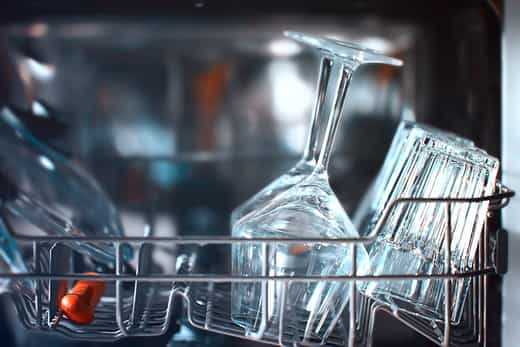
Another cause of dishwasher marks is improper loading of the glasses. When glasses come into contact with each other or with other dishware during the wash cycle, they can develop scratches or marks. This is especially true if glasses are overcrowded or if they are not securely placed in the dishwasher racks.
To prevent marks from improper loading, make sure each glass has its own space in the dishwasher rack and is placed securely. Avoid overcrowding the dishwasher to allow proper water flow and minimize contact between glasses and other dishware.
3. Harsh Detergents
The detergent you use in your dishwasher can also contribute to dishwasher marks. Certain dishwasher detergents contain harsh chemicals that can etch the surface of the glass, leaving permanent marks. Additionally, some detergents may leave a residue on the glass, which can appear as cloudy or streaky marks.
Choose a dishwasher detergent that is specifically formulated for glassware and opt for a gentle, non-abrasive formula. Avoid using excessive amounts of detergent and follow the manufacturer’s instructions on the packaging.
Conclusion
By understanding the causes of dishwasher marks, you can take proactive steps to prevent them and keep your glasses looking pristine. Utilize products designed to combat hard water residue, load your dishwasher properly, and choose a gentle detergent to ensure that your glasses remain free from marks and scratches.
Using Vinegar to Remove Dishwasher Marks
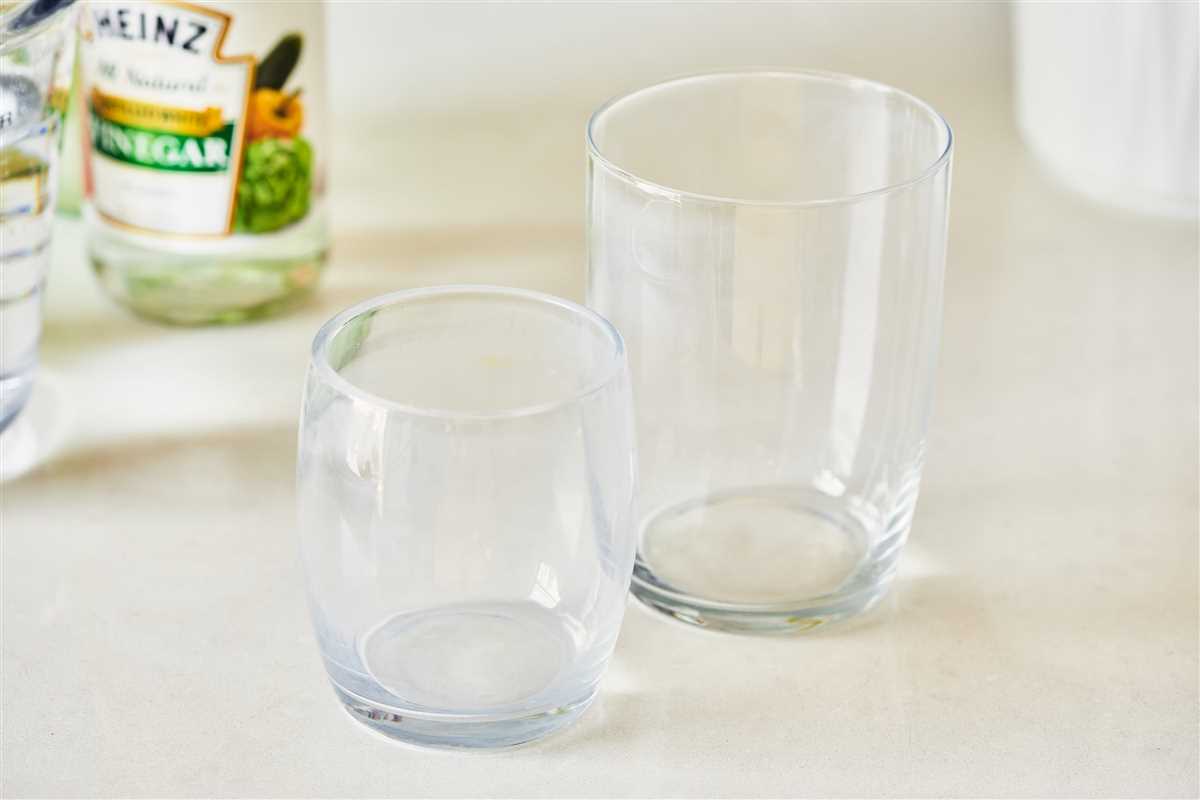
Vinegar is an effective and affordable solution for removing dishwasher marks from glasses. This natural ingredient can help to dissolve the mineral deposits left behind by hard water, leaving your glasses clean and sparkling.
Steps for Using Vinegar to Remove Dishwasher Marks:
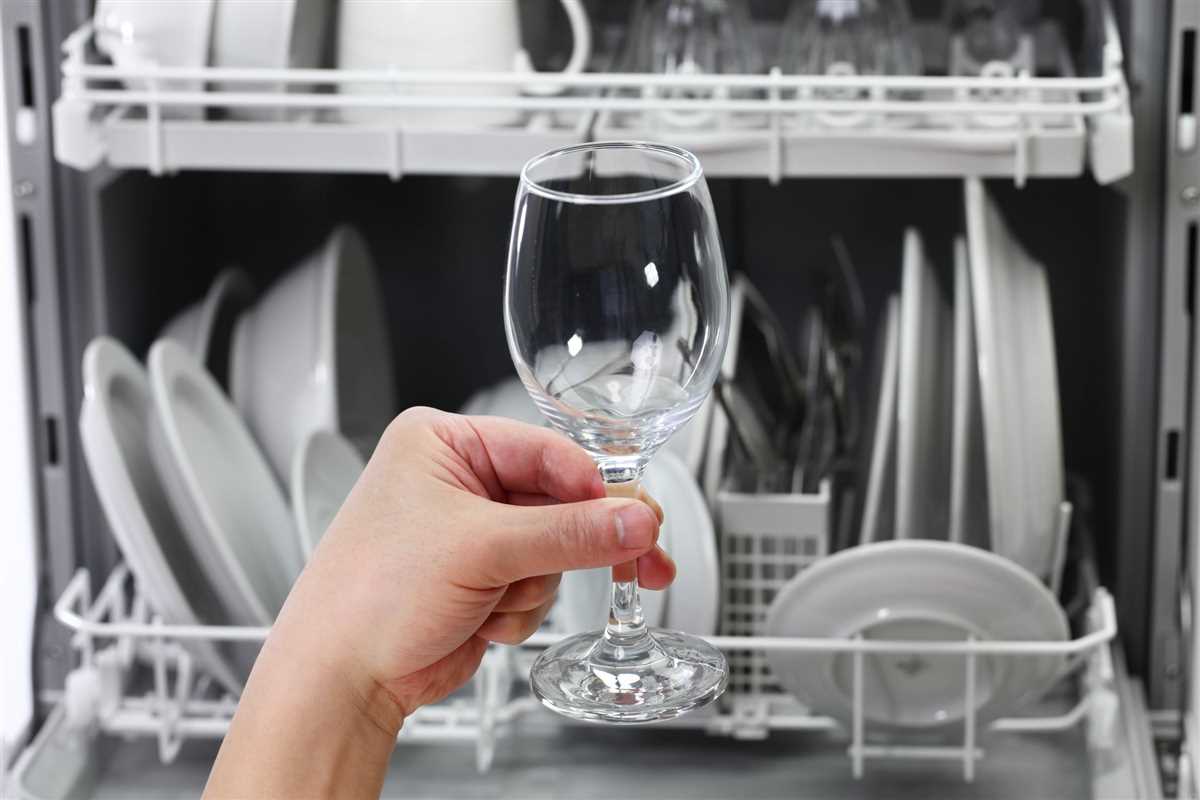
- Fill a basin or sink with a mixture of one part white vinegar and three parts warm water.
- Submerge the dishwasher-marked glasses in the vinegar solution, ensuring that they are fully covered.
- Allow the glasses to soak in the vinegar solution for at least 30 minutes. For more stubborn marks, you may need to soak them overnight.
- After soaking, remove the glasses from the vinegar solution and rinse them thoroughly with clean water.
- Inspect the glasses to check if the dishwasher marks have been successfully removed. If any marks remain, repeat the process or try alternative methods.
Note: It’s important to only use white vinegar for this method, as other types of vinegar may leave residue or odor on the glasses.
Tips and Tricks:
- For extra stubborn dishwasher marks, you can try scrubbing the affected areas with a paste made from equal parts vinegar and baking soda.
- To prevent future dishwasher marks, consider using a rinse aid or adding a cup of vinegar to the dishwasher’s rinse cycle.
- Regularly cleaning and descaling your dishwasher can also help reduce the occurrence of dishwasher marks.
Using vinegar is a simple and natural method for removing dishwasher marks from glasses. Give it a try and enjoy clean, spot-free glassware!
Removing Dishwasher Marks with Baking Soda

Dishwasher marks on glasses can be unsightly and difficult to remove. Luckily, there is a simple and effective method using baking soda that can help restore your glassware’s shine.
What You’ll Need:
- Baking soda
- Warm water
- A soft cloth or sponge
Instructions:
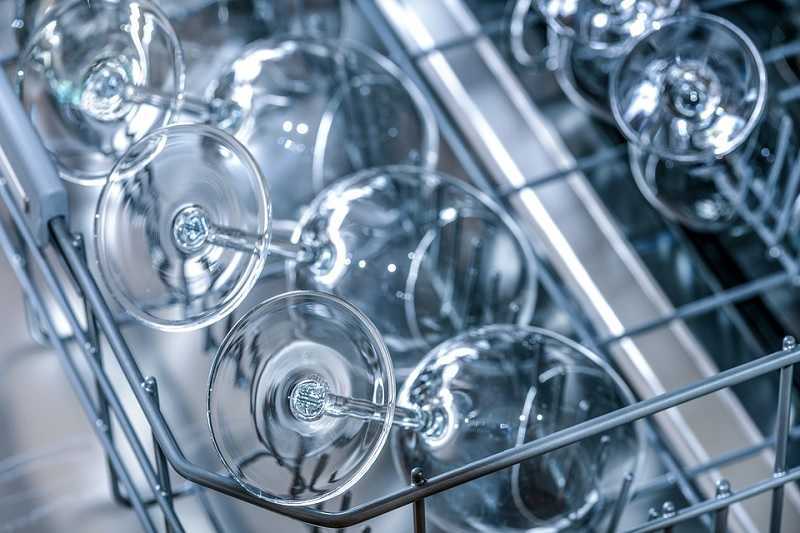
- Fill your sink or a large bowl with warm water.
- Add a few tablespoons of baking soda to the water and stir until it dissolves.
- Place the dishwasher-marked glasses into the water mixture, making sure they are fully submerged.
- Let the glasses soak for about 30 minutes to an hour.
- After the soaking time, use a soft cloth or sponge to gently scrub away the dishwasher marks.
- Rinse the glasses thoroughly with clean water to remove any remaining baking soda residue.
- Dry the glasses with a clean cloth or let them air dry.
Note: For tough dishwasher marks, you can make a paste by mixing baking soda with a small amount of water. Apply the paste to the affected areas, let it sit for a few minutes, then scrub and rinse as usual.
Remember to always check your glassware for any special care instructions or warnings from the manufacturer before using any cleaning method.
This simple method using baking soda can help you remove dishwasher marks from your glasses, allowing them to regain their shine and clarity.
Using Lemon Juice for Dishwasher Marks Removal
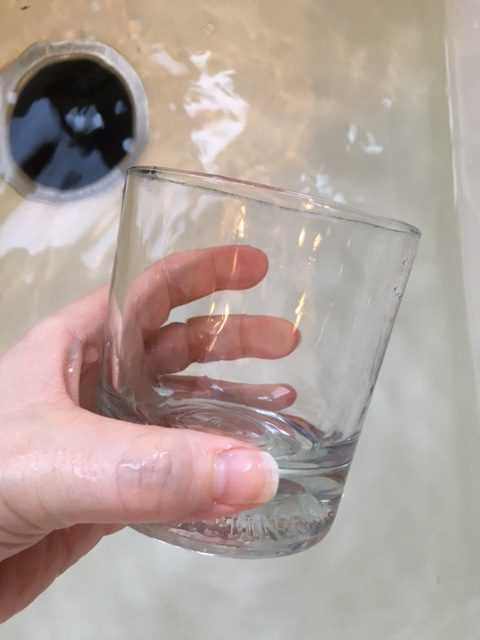
Lemon juice is a natural and effective solution for removing dishwasher marks from glasses. It contains citric acid, which is a powerful cleaning agent that breaks down the mineral deposits left behind by hard water and dishwasher detergent. Here are some steps to follow:
- Fill a small bowl or basin with fresh lemon juice. You can squeeze the juice from fresh lemons or use bottled lemon juice.
- Soak the dishwasher-marked glasses in the lemon juice for about 15-30 minutes. Make sure the affected areas are fully submerged.
- After soaking, use a soft cloth or sponge to gently scrub the glasses. The acidic properties of the lemon juice will help loosen and remove the marks.
- Rinse the glasses thoroughly with water to remove any remaining lemon juice.
- Dry the glasses with a clean, lint-free cloth or let them air dry.
It’s important to note that lemon juice may not be suitable for all types of glasses, especially those with delicate or sensitive surfaces. It’s always a good idea to test the lemon juice on a small, inconspicuous area of the glass before treating the entire surface. If any adverse reactions occur, stop using lemon juice and try an alternative method.
Using lemon juice is a cost-effective and eco-friendly way to remove dishwasher marks from glasses. It’s a natural alternative to harsh chemical cleaners and can leave your glasses clean and sparkling. Give it a try and see the difference it makes!
Preventing Dishwasher Marks with Soft Water
One effective method for preventing dishwasher marks on your glasses is by using soft water. The hardness of water is determined by its mineral content, particularly calcium and magnesium. Hard water can leave mineral deposits and residue on your glasses, resulting in unsightly marks.
By using a water softener or an alternative solution, you can minimize the hardness of water in your dishwasher. Here are a few steps to prevent dishwasher marks with soft water:
- Install a water softener: A water softener is a device that removes minerals from the water supply. It can be installed at the entry point of your home’s water system to ensure that all water used in your dishwasher is softened.
- Use a rinse aid: Adding a rinse aid to your dishwasher can help to prevent mineral deposits on your glasses. Rinse aids contain surfactants that break down water molecules, preventing them from clinging to your glassware. Make sure to choose a rinse aid specifically designed for use in dishwashers.
- Regularly clean your dishwasher: Over time, mineral deposits can accumulate in your dishwasher, which can then transfer onto your glasses. Clean your dishwasher regularly by running it empty with a dishwasher cleaner. This will help remove any built-up residue and keep your dishwasher functioning optimally.
- Hand wash delicate glasses: For delicate glasses or those with intricate designs, it may be best to hand wash them instead of using the dishwasher. This will help prevent any potential damage or marks that can occur during the dishwashing process.
By following these tips and using soft water in your dishwasher, you can help prevent dishwasher marks on your glasses and keep them looking clean and pristine.
FAQ
What are some effective methods for removing dishwasher marks from glasses?
One effective method is to soak the glasses in a mixture of vinegar and water for about 30 minutes, then scrub the marks with a soft sponge or cloth. Another method is to make a paste with baking soda and water, apply it to the marks, and let it sit for a few minutes before scrubbing. Additionally, using a commercial glass cleaner specifically designed for removing dishwasher marks can also be effective.
Can I use bleach to remove dishwasher marks from glasses?
No, it is not recommended to use bleach to remove dishwasher marks from glasses. Bleach is a harsh chemical that can damage the glass and leave behind a strong odor. It is best to use gentler methods, such as vinegar and baking soda, to safely remove the marks without causing any harm.
How long should I soak the glasses in vinegar and water?
It is recommended to soak the glasses in a mixture of vinegar and water for about 30 minutes. This will give the vinegar enough time to break down the dishwasher marks, making them easier to scrub off. You can also adjust the soaking time based on the severity of the marks, but be careful not to leave them for too long as it may affect the glass.
Can I use a scrub brush to remove dishwasher marks from glasses?
Using a scrub brush may be too abrasive for delicate glassware and can potentially scratch or damage the surface. It is recommended to use a soft sponge or cloth to gently scrub the marks. If the marks are stubborn, you can try using a melamine foam eraser, also known as a magic eraser, which is gentle yet effective for removing stains and marks without damaging the glass.
Are there any preventive measures to avoid dishwasher marks on glasses?
Yes, there are several preventive measures you can take to avoid dishwasher marks on glasses. Firstly, make sure to load the glasses properly in the dishwasher, avoiding overcrowding and ensuring they are securely spaced apart. Additionally, using a gentle and effective dishwasher detergent, and avoiding high heat settings, can help prevent the formation of marks. Lastly, removing the glasses from the dishwasher as soon as the cycle is complete and allowing them to air dry can also minimize the risk of marks.















